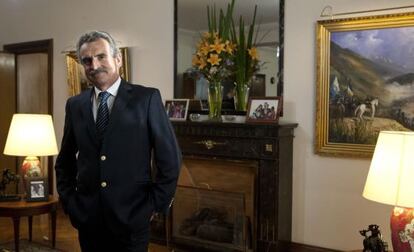“The military should never be called out to help in the drug-trafficking fight”
Argentina’s defense minister explains that armed forces are only securing border areas


In 2011, Argentinean President Cristina Fernández de Kirchner decided to call out the military to start helping control air space and borderlands in the north of the country. The operation, called North Shield, involves between 315 and 415 air force officers patrolling the air space on the borders with Bolivia, Paraguay and Brazil, as well as a number of ground troops operating radars. Their mission is to stop drug trafficking and contraband.
But the move has been a controversial one. Unlike in other Latin American nations, it is very rare to see uniformed military officers holding weapons on the streets of Argentina. When democracy was restored following the 1976-1983 bloody military dictatorship, the armed forces were removed from internal security matters.
Their current role is limited. In an interview with EL PAÍS, Defense Minister Agustín Rossi explained that the military’s only duties are to inform the federal police or naval police about suspicious movements.
Question. What are the duties of the armed forces in border areas?
Answer. In Argentina, we have a system of laws and regulations by decree that rules out the possibility of the armed forces participating in internal security. They are prohibited from taking part in the fight against crime, whether it is against individuals or organized groups. And the government rigidly follows this. We agree with this system ideologically for many reasons. First of all, the armed forces are trained for actions that are different from those of the security forces, which are dissuasive and preventive measures. The armed forces are trained so that when they are called into combat their response is lethal. For this, in general terms, it is very inconvenient for the armed forces to participate in internal security.
Q. Why was it decided that the military should patrol the borders?
A. Because the president decided that it was necessary to strengthen security at our borders. Argentina’s northern border is the most extensive land border we have, and everyone knows that along land borders there are higher levels of problems that could occur. This doesn’t happen on the western border, which has a natural divide, the Andes.
Q. What problems could occur?
A. Illegal crossings and smugglings are the two most common problems along a land border.
Q. What do you think about the military fighting drug trafficking?
A. I don’t share this idea. Based on the experiences in other countries of the world you cannot come to the conclusion that it has been a positive thing or anything that comes close to looking like one. I don’t think it is the solution because, on the contrary, it could turn out the other way around: we might worsen the situation.
Q. Mexico is a case in point.
A. Mexico finds itself in the middle of a great debate, with strong social criticism that has generated some steps to correct this situation.
Q. Does the United States cooperate militarily with Argentina in patrolling the borders?
A. [Laughs]. With the United States, we have nothing. In the last joint exercises with American forces, Argentina came out against jointly addressing problems with defense and internal security.
Q. There are some who say that you have involvement in internal security issues.
A. They are wrong. I am not patrolling the July 9 Boulevard [one of Buenos Aires’ main arteries]. We just undertake controls of air space and land and waterway borders.
Tu suscripción se está usando en otro dispositivo
¿Quieres añadir otro usuario a tu suscripción?
Si continúas leyendo en este dispositivo, no se podrá leer en el otro.
FlechaTu suscripción se está usando en otro dispositivo y solo puedes acceder a EL PAÍS desde un dispositivo a la vez.
Si quieres compartir tu cuenta, cambia tu suscripción a la modalidad Premium, así podrás añadir otro usuario. Cada uno accederá con su propia cuenta de email, lo que os permitirá personalizar vuestra experiencia en EL PAÍS.
¿Tienes una suscripción de empresa? Accede aquí para contratar más cuentas.
En el caso de no saber quién está usando tu cuenta, te recomendamos cambiar tu contraseña aquí.
Si decides continuar compartiendo tu cuenta, este mensaje se mostrará en tu dispositivo y en el de la otra persona que está usando tu cuenta de forma indefinida, afectando a tu experiencia de lectura. Puedes consultar aquí los términos y condiciones de la suscripción digital.








































